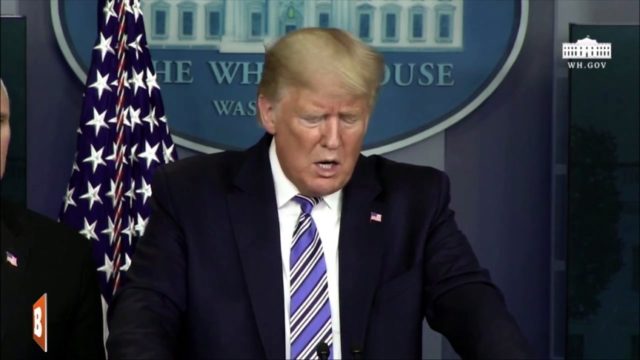Health experts from the National Academy of Sciences reportedly told the White House on Wednesday that limited research shows aerosolized droplets produced by talking or simply breathing may spread the novel coronavirus.
According to CNN Dr. Harvey Fineberg, the chairman of the National Academy of Sciences’ (NAS) Standing Committee on Emerging Infectious Diseases and 21st Century Health Threats, sent a letter to the White House about the research findings on Wednesday.
The letter came in response to a White House inquiry about the potential spread of the novel coronavirus illness (COVID-19) by talking. In late February, the White House and NAS established the panel chaired by Fineberg “to build on Trump administration efforts to confront the new coronavirus threat. One goal is to discourage misinformation and panic,” the Associated Press (AP) reported.
“While the current [coronavirus] specific research is limited, the results of available studies are consistent with aerosolization of virus from normal breathing,” Dr. Fineberg wrote in the letter to the White House.
Echoing the recent findings of a U.S. National Institutes of Health (NIH) study, the doctor added:
This letter responds to your question concerning the possibility that [coronavirus] could be spread by conversation, in addition to sneeze/cough – induced droplets. Currently, available research supports the possibility that [coronavirus] could be spread via bioaerosols generated directly by patient exhalation.
In the letter, Dr. Fineberg reportedly explained that research at a hospital in China shows the coronavirus can be suspended in the air while health care workers remove protective equipment or when the employees move around and clean the floors.
The letter pointed out that the research, carried out by the University of Nebraska, revealed that genetic material from the disease was present in rooms more than six feet away from coronavirus patients.
Aerosolized coronavirus droplets can linger in the air and potentially infect an individual who walks by at a later time, Dr. Fineberg told CNN.
He noted that several factors dictate how long the coronavirus will remain in the air, including “how much virus an infected individual puts out when breathing or talking, and also … the amount of circulation in the air.”
“If you generate an aerosol of the virus with no circulation in a room, it’s conceivable that if you walk through later, you could inhale the virus,” Fineberg explained. “But if you’re outside, the breeze will likely disperse it.”
Social distancing guidelines from the Centers for Disease Control and Prevention (CDC) and World Health Organization (WHO) suggest that people stay at least six feet apart from one another if they are contagious or merely concerned about being exposed to someone carrying the virus, noting that the disease can be spread “through respiratory droplets produced when an infected person coughs or sneezes.”
The CDC noted that the virus spreads from person to person when a carrier coughs or sneezes. Droplets produced by coughs or sneezes can reportedly land inside the mouths or noses of individuals who are nearby. People can also possibly inhale the virus into the lungs.
The letter to the White House echoed the findings of an NIH study that said the coronavirus illness (COVID-19) “can remain viable and infectious” in the air for at least three hours.
CDC officials are reportedly mulling recommending widespread use of masks. Some localities have already issued ordinances demanding that the vast majority of residents wear some type of face-cover when out in public, threatening violators with hundreds of dollars in fines.
Dr. Fineberg told CNN he would wear start wearing something to cover his mouth when he goes to the grocery store.
“I’m not going to wear a surgical mask, because clinicians need those,” Fineberg declared. “But I have a nice western-style bandana I might wear. Or I have a balaclava. I have some pretty nice options.”
On Tuesday, Dr. Anthony Fauci, a vital member of the White House Coronavirus Task Force, told CNN that the federal government is actively discussing advising the widespread use of masks to stem the spread of the virus.

COMMENTS
Please let us know if you're having issues with commenting.